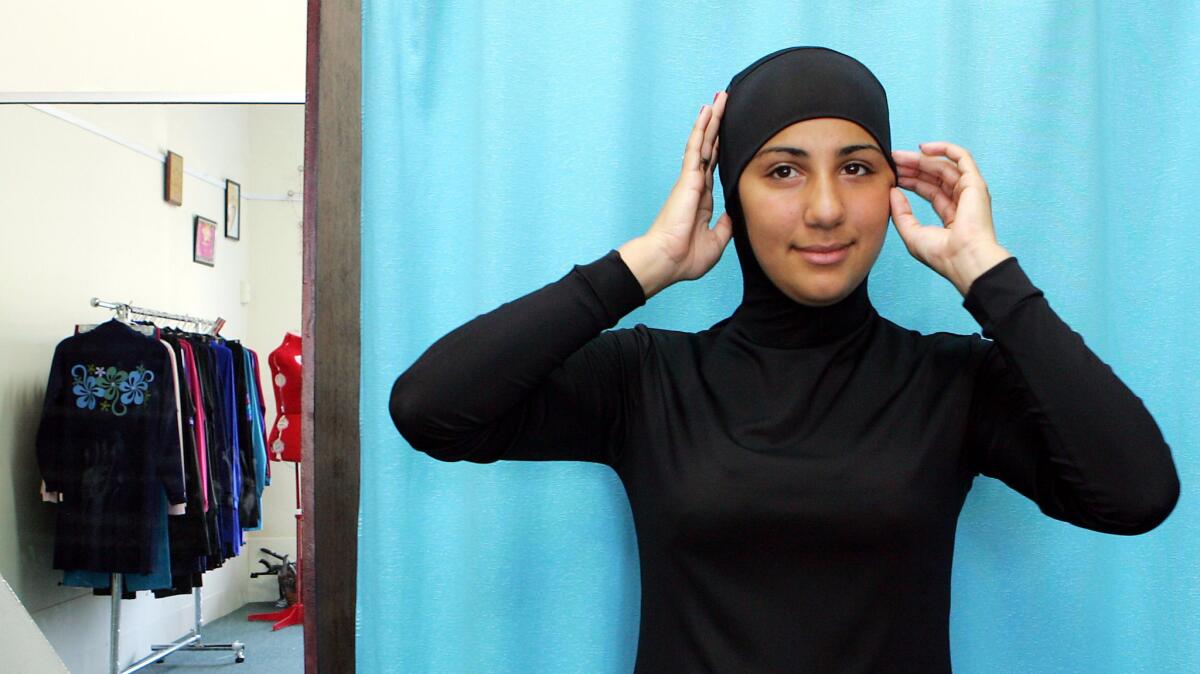‘Burkini’ day at French swimming pool canceled after outcry

- Share via
Reporting from Paris — Officials in the south of France forced a Muslim women’s organization to cancel a pool party after protests over Islamic clothing rules.
Michel Amiel, the center-left mayor of the Provencal town of Les Pennes-Mirabeau, persuaded the swimming park to annul the reservation for the private event, which he described as a “provocation”.
The controversy broke out after the group Smile 13, which describes itself as a “social, cultural, sporting and professional” association for women and children, privately booked the SpeedWater Park at the town of Pennes-Mirabeau, near Marseille, for September.
Its poster advertising the event stated it would be open only to women and children, including boys under 10, and requested that attendees wear clothing that covered “from the chest to the knees”.
It added that “exceptional” authorization had been obtained for women to wear burkinis and pool jilbab — swimsuits and poolside garments that cover most of the body — both of which are normally banned in public baths in France.
“We are counting on you to respect the AWRA (Islamic rule requiring parts of the human body to be covered) and not come in a two-piece (chest to knees must be covered). The minimum is a one-piece swimming costume with pareo or shorts,” the poster read.
On Smile 13’s Facebook page, which has since been taken down, the organization explained the clothing request was necessary because the pool has “mixed” staff.
The wearing of veils and anything covering the face is banned in public places in France under a 2010 law that was upheld by the European Court of Human Rights. All visible religious signs are banned from schools and colleges and among public-sector staff, and there are strict rules on swimwear in public pools. Because this was a private event, the group was within its rights to demand a dress code, but local politicians saw it as contrary to France’s institutional secularism.
“This is communitarianism, pure and simple,” Amiel, a center-left senator from the Democratic and Social European Group, told Le Parisien newspaper last week, adding that he was “shocked and angry” when he learned of the dress code and was planning to have the event banned as a “threat to public order”.
Before the cancellation, Valérie Boyer, the local member of Parliament for Les Republicains, the center-right opposition party, feared the event would be divisive.
“It is not an anodyne issue. The battle of the ‘veil’ is a visible sign of fundamentalists wanting to mark their territory and subjugate women,” Boyer said in a statement.
“Burka, chador, abaya, niqab, hijab … it doesn’t matter what you call them, they are a gender prison, a negation of the individual, an obstacle to equality, an obstacle to fraternity.”
France’s far-right Front National said in a statement that the event was further evidence of the “infiltration of Islamism into civil society,” which it claimed was “aimed at spreading an ideology that is fundamentally against the values of the republic.”
In the end, town hall officials persuaded the SpeedWater Park to cancel Smile 13’s reservation.
“Neither SpeedWater Park, nor the town of Pennes-Mirabeau wish to be the theater for public order troubles caused by factors outside of their role and influence,” said the park and the town hall in a joint statement.
The association said it had received bullets in the mail following the controversy, and that it had complained to the French Collective against Islamophobia.
On Saturday, when its Facebook page was still up, Smile 13 published a statement saying it regretted that there had been such a backlash and that it had provoked death threats to its organizers.
“We are sad and concerned by the massive wave of racist hate, crude insults and threats we have been subjected to not just as an association but also as individuals,” it read.
It added it was “stunned and saddened” by the level of controversy the planned event had provoked.
In March, France’s women’s rights minister Laurence Rossignol sparked a public war of words when she criticized fashion labels including H&M, Uniqlo and Dolce & Gabbana for including “Islamic” clothing in their latest collections.
She described the fashion as “irresponsible” and accused the labels of “promoting the imprisoning of the female body.” Talking to RMC radio, she compared Muslim women who bought clothing linked to their religion to “American blacks who were in favor of slavery.”
Willsher is a special correspondent.
MORE WORLD NEWS
Brazil is struggling to keep the Olympics free of politics
China’s crackdown on dissent is described as the harshest in decades
Did a U.S. think tank sponsor a military coup? Turkey thinks so.
More to Read
Sign up for Essential California
The most important California stories and recommendations in your inbox every morning.
You may occasionally receive promotional content from the Los Angeles Times.










